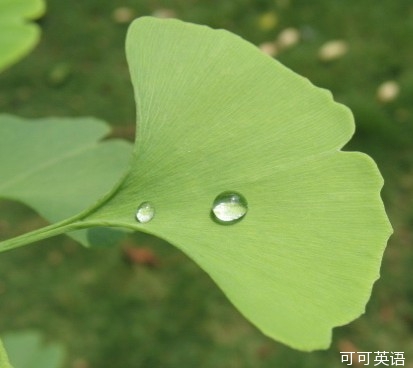
Science and Technology Pesticides Smoking them out
科技 農藥 把它們熏死
Tobacco extracts protect plants from pests and pathogens
煙草提取物可用于植物病蟲害
THERE are, as Paracelsus put it, no poisons—only poisonous doses. That is certainly true of nicotine. The amount in a puff from a cigarette acts as a pleasant stimulus. The amount in a packet of 20, injected in one go, would kill you.
巴拉賽爾士曾說:世上其實沒有毒藥,所謂的毒藥只是有毒性罷了(更正:所謂的毒性只是劑量變化引起的而已)。對于尼古丁,這當然是確切無疑的。吸一口煙你可能會覺得神清氣爽,但如果一次性把一包20支的煙全下去(更正:但是如果一次性注射一包20支煙的尼古丁劑量),可是會要了你的命的。
The Victorians understood this and regularly used nicotine as a lethal poison—not for people (except in the minds of a few crime novelists) but for insects. The invention of modern, synthetic insecticides has more or less killed that practice off. But Cedric Briens of the University of Western Ontario is thinking of reviving it, and is also asking whether tobacco has any other pesticidal properties that might be exploited by the hard-pressed horticulturalist.
維多利亞時代的人明白這一點,并且逐漸把尼古丁當做一種致命毒藥來使用(更正:并且已經把尼古丁作為一種常見的致命毒藥來使用)——不是用來殺人(除了在一些犯罪小說家的構思中),而是用來殺蟲。而現代合成殺蟲劑的發明在一定程度上結束了尼古丁的使命。現在,西安大略大學的塞德里克?布里安則又在考慮重新啟用尼古丁,同時在設法驗證煙草是否具有一些窮困潦倒的園藝家曾苦苦追尋的殺蟲效果(更正:同時在設法驗證煙草是否還有其他殺蟲功能,期望可為飽受病蟲害之苦的園藝家所利用)。
To find out, Dr Briens and his colleagues at Canada's agriculture ministry ground up dried tobacco leaves using a blender and a sieve. They then heated the result in a pressurised, oxygen-free environment to distil out what they could in the form of a treacly oil. They tested this oil on 11 species of fungus and four types of bacterium that are common agricultural problems. They also tried it on the larvae of Colorado beetles, a notorious pest of potatoes.
為此,布里安博士和他在加拿大農業部的同事們用攪拌機和篩子將煙葉碾碎,然后將碾碎后的煙葉在高壓、無氧環境下加熱,提取出一種以粘稠油狀存在的物質。他們用這種油對農業中常見的11種真菌和4種桿菌,以及一種常見的令人聞之生厭的馬鈴薯害蟲——科羅拉多甲蟲進行了試驗。
As they report in Industrial and Engineering Chemistry Research, the researchers found that several pestilential organisms were affected by the oil. Specifically they discovered that Pythium ultimum, a fungus that attacks aubergines, peppers, lettuces, tomatoes and cucumbers as seedlings, Clavibacter michiganensis, a bacterium that kills young plants and deforms fruits, and Streptomyces scabies, a second bacterium, which causes potatoes to develop revolting scabs and for which no treatment currently exists, all stopped growing in the presence of the oil. The beetle larvae, too, were killed—though that was no surprise, since the oil contained a lot of nicotine.
他們的研究結果發表在《工業化學與工程化學研究》上。研究報告顯示這種油對好幾種有害的有機生物有作用。研究明確地發現,在這種油的作用下,危害幼苗期茄子、青椒、萵苣、番茄、黃瓜的真菌——腐霉病菌,可使幼苗致死、果實畸形的桿菌——馬鈴薯環腐病菌,以及另一種導致馬鈴薯爛痂病,且目前沒有有效防治方法的桿菌——疥鏈霉菌,均被抑制生長。此外,甲蟲幼蟲也可被殺死——這其實是意料之中的,因為這種油里含有大量的尼古丁。
What was a surprise was that removing this nicotine did not diminish the oil's effectiveness against bacteria and fungi, and made it only marginally less effective against beetle larvae. The crude oil killed all of the larvae whereas the nicotine-free stuff left a fifth of them alive after two days. Clearly, there are other pesticides at work, and finding what they are is the next task. Meanwhile tobacco has proved itself a more useful substance than even the Victorians realised. Can its rehabilitation be far off?
但意料之外的是,將這種油去除后,對細菌和真菌的影響作用卻并沒有降低,只是對甲蟲幼蟲的作用在一定程度上減輕了。布滿這種油的環境中,所有的甲蟲幼蟲都被殺死,散亂分布的情況下,兩天后也只有五分之一存活。顯然,其它具有殺蟲作用的物質在起作用,下一步任務就是找出這些物質。這些發現證明了煙草不止可以用來做香煙,它甚至具有比維多利亞時代的發現更大的作用。如此,煙草的這種"復興"還會遠嗎?











